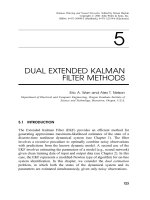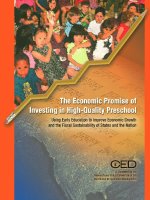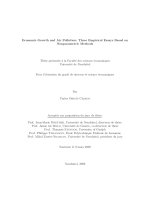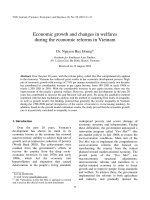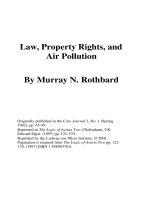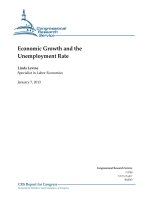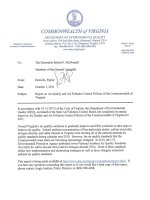ECONOMIC GROWTH AND AIR POLLUTION: THREE EMPIRICAL ESSAYS BASED ON NONPARAMETRIC METHODS docx
Bạn đang xem bản rút gọn của tài liệu. Xem và tải ngay bản đầy đủ của tài liệu tại đây (2.12 MB, 168 trang )
Economic Growth and Air Pollution: Three Empirical Essays Based on
Nonparametric Methods
Thèse présentée à la Faculté des sciences économiques
Université de Neuchâtel
Pour l’obtention du grade de docteur ès science économiques
Par
Carlos Ordás Criado
Acceptée sur proposition du jury de thèse:
Prof. Jean-Marie Grether, Université de Neuchâtel, directeur de thèse.
Prof. Jaime de Melo, Université de Genève, co-directeur de thèse
Prof. Thanasis Stengos, University of Guelph
Prof. Philippe Thalmann, École Polytechnique Fédérale de Lausanne
Prof. Milad Zarin-Nejadan, Université de Neuchâtel, président du jury
Soutenue le 9 mars 2009
Neuchâtel, 2009
..
Les propos et opinions exprimés dans ce document n’engagent que son auteur et en aucune manière
la Fa c ulté des Sciences Économiques de l’Université de Neuchâtel.
.
English abstract
Abstract: this dissertation includes 3 research papers, which explore empirically
the link between the level of economic activity and air pollution at the macroeco-
nomic level. A special emphasis is given to the application of recent tools developed
in the nonparametric field as they allow for a better control of po t ential misspecifica-
tion biases and they give more flexibility to the underlying relationships. Chapter 1
tests whether a sustainable link between per capita GDP levels and the environment
exists for a variety of air pollutants’ emissions in a panel of 48 Spanish provinces
over the period 1990-2002. Chapter 2 investigates how cross-country gaps in per
capita CO
2
emissions evolved over the 1960-2002 period for a panel of 166 world
areas as well as for several country sub-groupings (rich/poor countries, specific ge-
ographic regions, economically integrated areas). An analysis of the dynamic of
the cross-sectional distributions is conducted with robust scale and shape measures
and formal shape and multimodality tests are applied. The latter approach is con-
trasted with a stochastic convergence analysis à la Evans (1998). Chapter 3 makes
use of a broad range of regression techniques to fit a reduced form function, where
growth r ates in per capita CO
2
emissions are explained with past pollution levels,
past per capita GDP levels and per capita GDP growth rates. Panel models are
estimated with standard linear and nonlinear least squares and these specifications
are tested against their nonparametric counterpart. This framework also allows
exploring beta-convergence in per capita emissions conditional on GDP as well as
beta-convergence in GDP conditional on pollution.
Keywords: Air pollution, carbon dioxide emissions, Environmental Kuznets Curve,
convergence, distributional dynamics, mixed nonparametric and semiparametric re-
gressions, panel poolability test, unit roots.
.
Résumé en français
Résumé : cette thèse se compose de 3 recherches dont l’objectif est l’étude em-
pirique du lien entre croissance économique et pollution atmosphérique au niveau
macroéconomique. Elle privilégie l’utilisation d’outils récents issus de l’analyse non-
paramétrique car ils permettent une meilleure prise en compte de biais de mauvaise
spécification et introduisent plus de flexibilité dans la forme fonctionnelle étudiée.
Le premier chapitre vérifie l’existence d’une relation soutenable entre le niveau de
PIB par tête et l’environnement dans 48 provinces espagnoles pour différents pollu-
ants de l’air durant les années 1990-2002. Le second chapitre s’intéresse à l’évolution
des différences de niveau d’émissions de CO
2
par tête entre 1960 et 20 0 2 dans 16 6
pays, ainsi que dans divers sous-ensembles de pays (riches/pauvres, appartenant
à une même zone géogra phique, membres d’une zone d’intégration régionale. ).
La dynamique des distributions transversales est étudiée à l’aide de mesures ro-
bustes d’échelle et de forme fonctionnelle. Des tests d’égalité distributionnelle et de
multi-mo dalité sont également appliqués pour tester la stationnarité des densités
et l’émergence de différents modes. Ces résultats sont comparés à ceux obtenus
à l’aide d’une analyse de convergence stochastique à la Evans (1998). Le dernier
chapitre applique un large spectre de techniques de régressions à l’estimation d’une
forme fonctionnelle réduite, dans laquelle la croissance des émissions de CO
2
par
tête est fonction du niveau passé d’émissions par tête, du niveau passé de PIB par
tête et du taux de croissance du PIB par tête. Des modèles de panel sont estimés
par les moindres carrés ordinaires et les moindres carrés non-linéaires et ces spé-
cifications sont comparées à des modèles non-paramétriques alternatifs. Ce cadre
permet également d’explorer la notion de beta-convergence dans la pollution, con-
ditionnelle au PIB, ainsi que la beta-convergence dans le PIB, conditionnelle à la
pollution.
Mots clés : Pollution atmosphérique, émissions de CO2, Courbe de Kuznets En-
vironnementale, convergence, dynamique distributionnelle, régressions non et semi-
paramétrique mélangées, test d’empilement de panel, racine unitaire.
Acknowledgements
I would like to express my deepest gratitude to Prof. Jean-Marie Grether and Prof.
Jaime de Melo who inspired me in the field of economics and allowed me to undertake
the present research under their supervision and financial support. Many thanks for your
trust, your encouragements in all aspects of my work, your critical feedbacks and the time
spent reading the numerous drafts of my research papers, und er tight time constraints
sometimes.
I am warmly grateful to Prof. Milad Zarin-Nejadan (University of Neuchâtel) and to
Prof. Thanasis Stengos (University of Guelph, Canada) for co-supervising my work as
well as for their kindness. Prof. Thalmann (University of Lausanne) has also accepted to
provide his expertise to this work, which I am sincerely indebted.
The Institute for Res earch in Economics from the University of Neuchâtel (Irene) has
been the memorable place where I have shared my joys, doubts, efforts and my desk with
stimulating colleagues, who have become friends. Thank you to Martine, Françoise and
Kira for their help and smiles in all circumstances, and for m ak ing our institute feeling
like a home. Mathieu, Johanne, Sonia, Gilles and M oez have very much contributed to
make that time unforgettable, pushing me to find the right balance between work and
refreshing breaks. My sincere acknowledgments also go to our IT scientists, Abdel, David
and Florian, as well as to our library staff, Denis, Sandra and René for always providing
the quick and flexible support needed in my task.
I owe a great debt to my friend David Ardia, for the passionate talks on many technical
aspects of my work, going from statistical/econometric issues to a variety of computational
problematics (in the R and Latex environments in particular). His expertise has been a
great asset.
I had the chance to spend a year of my PhD program visiting several Economic De-
partments in Canada (at the University of Guelph, the University of Toronto and the
University of Calgary) under a grant kindly provided by the Swiss National Science Foun-
dation. Thanks a million to the many people who made my visits possible and for having
provided all the facilities for my researches.
Least but not last, my family has always been by my side in this academic adventure.
Thanks Dad, Javier and Iván for being there when I was absorbed in my dissertation.
Javier has been kind enough to revise the English drafts of my papers. Thank you Joëlle
for your love, support and optimism.
Carlos Ordás Criado
